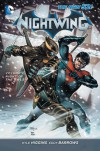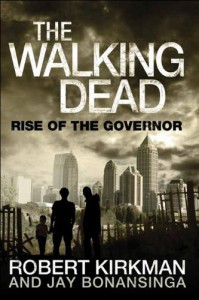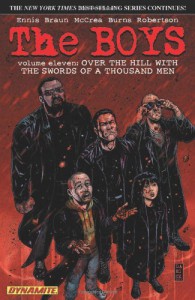Currently reading
The Sea of Monsters
Paladin of Souls
Batman: The Night of the Owls
Nightwing, Vol. 2: Night of the Owls
 Crossposted at The Bibliosanctum.
Crossposted at The Bibliosanctum.This book is a series of mini-arcs giving a glimpse of a world where Bruce Wayne’s Batman doesn’t exist. It asks: “What kind of ripples would’ve been made in the world if Bruce had been the one to die in that alley and not his parents?” Initially, I read “Batman: Knight of Vengeance,” and that was it. That's all I wanted to read, I said vehemently. However, I finally decided to dive into the rest of the story and see what Bruce’s death changed beyond his parents lives.
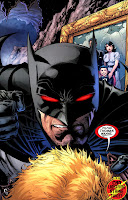
In “Batman: Knight of Vengeance,” Thomas Wayne has taken on the mantle of the bat, and he is far more brutal, unforgiving, and decisive than Bruce. While Thomas subscribes to hyper-vigilantism and toes the line of being crime boss, Martha’s response to Bruce’s death is far more extreme than Thomas’. This story was heartbreaking in so many ways. From the Waynes to Selina to Commissioner Gordon, it was so poignant and painful to read. I have to say that this is my favorite story in the book.
“Deadman and the Flying Graysons” answers the questions of what happens to Robin (Dick Grayson) if there is no Batman. Dick’s parents live and they continue to tour with the circus. However, Aquaman and Wonder Woman war violently with each other, and the circus travels through war-ravished Europe, eventually finding itself on the receiving end of Wonder Woman’s fury. This was an okay story. Loved the basis for it with Wonder Woman and Aquaman’s war, but it wasn’t fully realized, in my opinion.
“Deathstroke and the Curse of the Ravager” follows the dread pirate Deathstroke who plans to profit off the turmoil that Wonder Woman and Aquaman have created, but first, he has to rescue his daughter, Rose, from his rival. To do any of this, though, they have to sail to Aquaman’s angry seas. What could go wrong there? I liked this more than I thought I would to be honest. It made Deathstroke very likable.
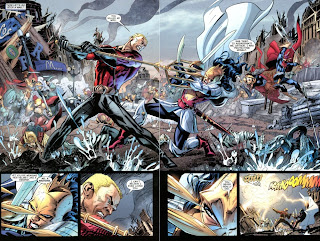
The last story “Secret Seven”… was maybe a little beyond my frame of reference. All I know is that a team is being formed to deal with the chaos on earth. I don’t want to call it a terrible story because it wasn’t… I don’t think. I just don’t have much experience with the character(s). It was a little offbeat, which I definitely don’t mind, but because I don’t have any real point to fix these characters, too, it was just… I’m not really sure how to describe it to be honest. I had way too many questions after reading this one, and I blame this on my ignorance of the characters.
Some would argue that these stories have no real connection and deal so little with Batman, but I disagree. They show that Batman, Bruce’s Batman, is both a blessing and a curse to the villains and heroes of the DC universe. It shows how his existence/non-existence shapes that world in broad terms. For instance, many of the villains lead drastically different lives. Some of them are already dead by Thomas’ hand. Some of the heroes are hardly what you’d call heroes at all. I do think that there needed to be more meat to this. The idea of what the world would be like without Bruce Wayne is a very fascinating question that this series only half-answered. However, I still mostly enjoyed this book.
 2.5 stars. Disclosure. I've only read the first volume of The Walking Dead. I'd been meaning to get around to these books quite some time before the show started, but it wasn't until the show that I decided it was time to take the leap. So, I've read the first volume and, as of this writing, I'm reading the novel, The Walking Dead: Rise of the Governor. I figured it wouldn't hurt to read this because it was going to be all about Michonne's life before meeting up with Rick and the gang, and I wouldn't be lost. Right? Ha!
2.5 stars. Disclosure. I've only read the first volume of The Walking Dead. I'd been meaning to get around to these books quite some time before the show started, but it wasn't until the show that I decided it was time to take the leap. So, I've read the first volume and, as of this writing, I'm reading the novel, The Walking Dead: Rise of the Governor. I figured it wouldn't hurt to read this because it was going to be all about Michonne's life before meeting up with Rick and the gang, and I wouldn't be lost. Right? Ha! The story begins with Michonne running home from work during the start of the zombie apocalypse. We learn meet her boyfriend and his idiot best friend (who inadvertently doomed the both of them). We learn that she turned them into her pet zombies to help her bypass the walkers. We learn that she talks to them to remind herself of who they were before turning and to have someone to talk, but that's about it. After that, I'm guessing the rest of her story coincides with one of the comics in the main arc because she saves Otis and is granted admission into the prison. I don't think it's really accurate to say that this is a Michonne special since so few pages were actually dedicated to her actual personal story. It wasn't poorly written, but just disappointing and misleading.
 First, I should say that, aside from Batman Vol. 1, this review also takes in account Nightwing, Vol. 1: Traps and Trapezes. I read it because I find with DC comics, when I’m interested in a crossover storyline, the supplemental comics feel necessary more than complementary to me in order to get the full scope of what’s happening, which is a conundrum I don’t have with other comic companies.
First, I should say that, aside from Batman Vol. 1, this review also takes in account Nightwing, Vol. 1: Traps and Trapezes. I read it because I find with DC comics, when I’m interested in a crossover storyline, the supplemental comics feel necessary more than complementary to me in order to get the full scope of what’s happening, which is a conundrum I don’t have with other comic companies.I recently read Batgirl: Knightfall Descends, and I thought the mini-story “In the Line of Fire” was amazing, but it ended on such a frustrating, high-tension cliffhanger. I needed to know what happened, and that “Read Batman” note at the end made me cringe a little. That meant I was going to have to call out my hired guns on the DC comics front for a comprehensive reading guide to the story. They’re quick on the draw, and they’ve never failed me before. This time was no exception.
One of the things that stood out to me when reading “In the Line of Fire” was how much it felt like Batman R.I.P. with the Black Glove reimagined as The Court of Owls, and it was probably these familiar elements that really piqued my interest. I apologize in advance for any more comparisons between the two stories that might pop up. I know Batman R.I.P. is one of those divisive stories that people either love or hate, and while I had issues with some of the elements used in that story, I’m firmly in that camp that enjoyed it.
Normally, I don’t care for the “same story, different day” rehashing, but I wanted to give this a chance and not just write it off as a reboot of Batman R.I.P. Maybe this story would get things right where I thought Batman R.I.P had gotten it wrong. Maybe it would turn out way differently than I was expecting. Besides, I knew it couldn’t be exactly like that story. Reading “In the Line of Fire” already hinted at some possible exciting new angles for the story. Did this deliver? Well, I can’t give a complete answer yet since I still have more books to read, but I can say that I mostly enjoyed this and Nightwing’s Traps and Trapezes.
Batman finds himself facing off with a deadly group known as the Court of Owls, purported to be only monsters in a children’s nursery rhyme, as they systematically begin to take over Gotham City. This move seems to be partly fueled by Batman’s actions as Bruce Wayne. Bruce is intent on making Gotham City a beautiful place by gentrifying it. He seems to focus less on the people he supposedly protects and more on his own interests for the city. Both Bruce and the Owls claim the city belongs to them, and both sides are willing to take drastic measures to seize control of Gotham.
Before the DCnU, I’d already started having some mixed feelings about Batman as I read more about him and the bat family. I think this tradition will continue in DCnU. Bruce has annoyed me with his “GOTHAM! MINE!” attitude in just about everything I've read him. In this story, it’s admirable that he wants to clean up Gotham for good, but it only appears to be for selfish reasons without much thought about the disparate social hierarchy at play that firmly puts people like Bruce Wayne at the top of the food chain and acts a fuel fodder for some of the crime there. He wants to clean it up because it’s “his city” and not “the people’s (including him) city.”
However, I do like that this isn’t something that’s overlooked in the comics. I really appreciate that comics like Batgirl and Nightwing sort of deal with that unequal treatment. Barbara wonders if what they’re doing only continues to feed a vicious cycle (the rich versus the poor) and if they really are heroes in that case. And Dick firmly believes that you need to live where you fight so you get a sense of the people and the outlook there. He’s given up a luxury apartment in favor of living among the Gothamites, which Bruce doesn’t agree with, naturally.
Bruce’s arrogance about how well he knows Gotham really shines through here. Even after being attacked by one of the Owl’s assassins, he continues to insist that he knows Gotham’s every secret. He claims there are no Owls because he doesn’t know about any Owls, and he knows everything about Gotham. He has eyes and ears everywhere, even going as far as installing a photogrammetric camera in the morgue, but for all his gadgets and knowledge, he is blindsided by the Owls who have their claws deeper in Gotham than he could ever imagine.
He can no longer profess to know the city more intimately than anyone else after the Owls are revealed to him. The Owls push him to the brink of his mental and physical capabilities, believing him to be broken once he escapes. Batman may have won a small battle against them, but there’s still the war to consider. Per usual, Batman loses himself in this one-man stand against injustice that he doesn’t seem to realize or care how his actions are affecting those around him. The way he treated Dick near the end of the story just broke my heart a little, especially since there's almost nothing Dick wouldn't do for him. However, I know that will pan out to be part of some great Batman scheme no one knew about in the end.
Everything about this made me draw parallels against Batman R.I.P., even down to the feelings it brought out for me, but I did enjoy this story. I never get tired of stories that push Batman to his limits and try to deal with the fine line of madness that he often seems to tread.
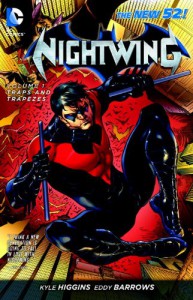 First, I have something to say to get it out of my system.
First, I have something to say to get it out of my system.Dick talks too damn much. I know it's a diversion, but my goodness! In my head, he sounds just like he does in Under the Red Hood (as voiced by Neil Patrick Harris), and it’s just nonstop, aggravating chatter in my head. It’s somewhat funny in a way that I say that, though. I remember thinking the exact same thing about him during the Batman R.I.P. story. On the next couple of pages in that comic, Dick says that he knows he talks too much while fighting, but that he thought he did it because Batman talks so little.
Just like in that story, everyone points out that Dick talks too much in this, too. Maybe that's a running gag with him. I don't read much Nightwing except in the event of crossovers. I can see why a villain would get easily annoyed with Dick. If I were a villain, I'd promise to go to jail without a fight if he'd just shut the #$^& up! End rant. Phew, I feel so much better, and I am so sorry you had to witness that tantrum. Now, let's get on with it, yes?
Traps and Trapezes runs concurrent to the events in Batman, Vol. 1: The Court of Owls. Nightwing has his own Owls related run-in, but in a very different way. Haly’s Circus returns to Gotham for the first time in years, prompting Dick to visit his old friends, even though the thought of visiting in Gotham (he’d visited them other cities) stirs up more painful memories than usual. After spending time with his old family, Dick has an encounter with a Talon-like assassin who claims that he (Dick) is Gotham’s deadliest murderer. This sets up a chain of events that leads to the secrets of the circus becoming known.
Dick’s blabbering aside, I think this is the first Nightwing book I’ve truly enjoyed. Not that the few other Nightwing books I read were bad, but I could never really get into his story before now. Dick doesn’t seem to have changed much from the old books. He’s still upbeat, a bit of a lady’s man, and willing to take a more optimistic view to the hero business than Bruce, but when he’s pressed, he takes on an almost Batman-like seriousness. Just as I mentioned in my review of The Court of Owls, I like that Dick's perspective on helping the city involves him living and breathing among the people of Gotham rather than holed away in the mansion or some plush penthouse. He believes in being among the people you protect. (Okay, and it's partly because he finds living in the heart of things exciting.)
After inheriting the circus from Mr. Haly, Dick travels the country with them hoping to find out who the assassin is and what he wants. What he finds is emotionally harrowing for him. But while Bruce’s run-in with the Owls makes him hyper-vigilant and almost distrustful of the city and his friends (which leads to an ugly confrontation with Dick), Dick’s encounter reaffirms the fact that you can choose your own destiny and break cycles. Bruce chose to live stubbornly with his arrogance that Gotham was his loyal bride, but Dick was willing to change with the situation and accept there are things going on that are beyond him.
I thought Higgins did an excellent job of fleshing out Dick's backstory more and entwining it with the Owls. It made the character feel fresh for me since I wasn’t well versed with his time as Nightwing before the reboot. During the course of this story, Dick finds out what his future could’ve been if Bruce hadn’t become part of his life. Dick’s parents’death and his eventual departure with Bruce had far-reaching implications that affected the lives of people who called him family at one time.
I think I enjoyed this more than Batman's book because it was something fresh where Batman's book felt like a familiar story being retold. Dick's side of things offered a different look at the events unfolding with the Owls.
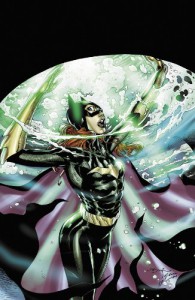 Just dial F for Feelings on this one.
Just dial F for Feelings on this one.My second journey into a Gail Simone book, and let me just say, that I really enjoyed this book. Gail seems to have found her footing in this book and with the character. Much of the campiness that slightly turned me off was toned way down in this book. There was still some campiness there, but not to the same degree as the previous volume. This book follows Barbara on a series of encounters ranging from a run-in with the Court of Owls and the emergence of vigilante named Knightfall who may have been an innocent girl turned into a crazed “hero” intent on saving Gotham by purging it of its evil.
The thing I’m finding very interesting in these books is the storytelling format. So far, the volumes have been made up of various mini-stories rather than having one specific arc focus. I think the reason this works so well with Barbara’s story is because we watch as she adapts to these different situations while coping with the various thoughts and feelings she has.
Continuing with the theme from volume one, Barbara still stands on shaky ground. She continues to be a dichotomy. She’s still trying to come to terms with her capabilities as a hero, and she’s beginning to question “the system.” She questions if they’re contributing to the problem by protecting the “haves” and their investments from the “have-nots” rather than addressing the problem of poverty and the disproportionate gap between the two. Is she truly a hero in this respect?
She also comes face to face with very important parts of her past in the form of her mother, which started in the last volume, and one of the thugs who witnessed her crippling at the hands of Joker (an encounter that turned out differently than I expected). There’s also the issue of Barbara’s brother, James, that she’s unaware is bubbling into something that will probably blow up on her soon. Throw in the fact that she’s still dealing with her survivor’s guilt and trauma, which tends to make her react in very emotional ways in some situations because she’s triggered.
A character that I’m rapidly becoming to enjoy is Melody McKenna, an investigator for GCPD whose story we learned more of in this volume. Barbara keeps insisting that Melody McKenna hates her. That is so not true, and it’s so obvious that it’s not. McKenna is upset with Barbara because of what happened with her partner after Barbara’s return. That’s obvious as well. However, while McKenna has an invested interest in Batgirl, she’s allowed Barbara on numerous occasions to do her thing. In this volume, McKenna seems to fully grasp what happened with her partner is truly not Batgirl’s fault because she relates a situation where she acted in a similar fashion as Barbara with the same outcome.
I could chalk this up to Barbara’s current conflicting feelings, though, how she seems to take everything so personally and feel it so deeply. She feels every loss. She sees the situation with McKenna’s partner as something she should’ve handled better, so maybe this insistence that McKenna hates is just transference of her own harsh views of herself onto a tangible person/object.
My only complaint with this was In the Line of Fire, which is issue #9 and part of the crossover with the Court of Owls. This pissed me off so bad, but not because it was bad. Truthfully, it was very good, and it was shaping up to be my favorite part of the book (now my favorite part is the Batwoman/McKenna/Batgirl team-up near the end), but it just ends without you really knowing what happens. I don’t think it really think this should’ve been included since it heavily depends on you reading issues from other books to get the full scope of what’s going on. The other stories have an “ending,” except this one, and then the next story goes immediately into this Knightfall storyline. You’re left wondering what happened, if you haven’t read it, because it was obvious a big deal. However, it does say that you need to go to Batman #9, but still, I had to track down this Owls business to read soon. Remember I said I wasn’t really wanting to get into all this DCnU stuff, but DC is making me.
I think this is shaping up into a fine book. I like the sort of darker approach to her return. It’s not all sunshine and rainbows. Barbara has issues that have plagued her return and will presumably continue to plague her for a while. Watching her triumphs and failures, her insecurities, her growing confidence, makes her feel like a very believable character.
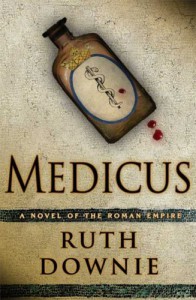 Crossposted at The BiblioSanctum.
Crossposted at The BiblioSanctum.This story follows military medicus (doctor) Gaius Petreius Ruso who is a Roman man living in Brittania (England). He's escaped to the Brittania to heal from a disaster of a marriage that ended in divorce and the death of his father that left the family with many undue debts to pay. Brittania is considered a backwater town but important nonetheless. It's too small to be considered grand, but too large to be ignored by the Romans. As if going from everything to having nothing wasn't bad enough, women continue to bring trouble for Ruso after he examines a dead woman found in the river and rescues a slave from her callous owner.
This story takes place during a time when modern medicine was just beginning to emerge. Doctors were regarded as suspicious conmen and "healers" still ruled surpreme. I loved how Downie weaved that into the story, showing how doctors began to record treatment and discover new ways to deal with various medical ailments and conditions. One of my favorite scenes in the book is when Ruso ushered around the new doctors in training and reveled in their naïveté after one fainted (and the others just barely made it out) when Ruso showed them a particular gruesome case. The description made me chuckle because it was just so Ruso-like.
Ruso is a bit cynical and serious, but he does have a little bit of a dry comedic side. He's very sure of his abilities as a medicus almost to the point of cockiness, but unlike his friend and fellow medicus, Valens, he keeps to himself in a world where knowing the right people means everything. He often feels awkward in social situations and almost always says the wrong things in his mind, so he tends to keep to himself. His bedside manners are cool because he's a man of logic, even by his own admission, but Ruso cares more about people more than he shows. This care extends beyond mere medical interest, but he's not sure how to "fix" people beyond what physically ails them.
Ruso complains that he shouldn't get involved in certain matters, but still he finds that his underlying compassion and concern causes him to do the exact opposite, which is how he ends up "investigating" a murder that he insists he's not investigating. He's also terrible at being a hard ass as shown when he became Tilla's "master." Tilla is just one of a group of ragtag friends he picks up during the course of the story which includes the charming Valens who thinks that Ruso needs a new wife, an overenthusiastic scribe named Albanus, and a dog he claims not to care for. He complains about them, of course, but I don't think he'd know what to do without them.
Despite all the elements that could make this a complicated story to listen to, it was very easy to follow. Nothing really went beyond my grasp or caused me to pause and rewind just to make sure I was understanding what I'd heard. Downie didn't use language that was too complicated, and the things that seemed a little unfamiliar she was able to explain in the simplest terms, even when it didn't really seem necessary. However, this was a surprisingly light listen. I was afraid that I would get partway in and decide that I need to read the book rather than listen to the audiobook.
One of the chief complaints I'd heard about this book was that the language was "too modern," but that's the usual complaint of many historical fiction settings ranging from books to television. I wasn't surprised to hear the complaint, but it just seems like old news now since many shows and books take this approach. I think that's because it makes it easier on the reader and the writer. How many people would really be interested in reading this if written in the style of that time? What writer would stick to writing a story in such a style? It would be tedious for both the reader and the writer. I agree that maybe some word choices absolutely were too modern, but that's such a nitpicky thing. However, I can only say that it doesn't bother me. Your mileage may vary.
My chief complaint is that, while I liked Ruso, he could be a bit annoying at times. I'd get mad at him for how he tried to treat Tilla, calling her property and trying to force her to call him master, even though he was terrible at being bossy--at least to Tilla. He does show a surprising amount of sexism that can be a bit annoying, too. Not because it's sexism, however. This is ancient Rome era we're talking about. It's annoying because it's obvious that he's not as sexist as most, but has defaulted to sexism because of his general disillusionment due to a bad marriage, which is understandable but so frustrating. Some of his actions were so obtuse to the point that I had to wonder if Ruso was okay mentally at times. An example being how he wanted the rumors about him investigating the murder to stop since he "wasn't investigating," but he made it his business to ask every person around if they'd heard he was investigating the murders. Really, Ruso?
As far as the narration goes, Simon Vance is quickly becoming one of my favorite narrators. He has a voice that is perfect for reading. This will be the third book I've listened to with him as the narrator and he never fails to impress me with his read. He's remarkable; his narration is always so impeccable. I have never encountered a narrator with such clean narration skills. Also, he understands that timbre not pitch determines how realistically a female voice will come across when reading, and even when faced with multiple female speakers in one scene, he gives them all their own personality that makes them easily discernible one from another.
The only real complaint I have is that he's a fast talker. I tend to speed up my audiobooks between 1.25 to 2.0 times faster than normal. With him, I have to get used to the pace he's keeping before I can speed it up, but that's really a trivial complaint when compared to how extraordinary he is as a narrator.
This was a great opening for the series, and I look forward to following more of Ruso's misadventures as narrated by Simon Vance.
 Crossposted at The Bibliosanctum.
Crossposted at The Bibliosanctum.Full disclosure. I stopped reading the New 52 after four comics. I read Mister Terrific #1, Justice League #1, Detective Comics #1, and Swamp Thing #1. Out of those four comics, I was only impressed with Detective Comics and Swamp Thing. Justice League was only “meh” and didn’t feel like it was worth the trouble of continuing at that point, and Mister Terrific was terrible when it had so much potential to be great. Even though I did enjoy Detective Comics and Swamp Thing, I still put them on the back burner in favor of other comics that I wanted to catch up on. Admittedly, I was one of those people who wasn’t that excited to see Barbara assume the Batgirl mantle again. I love Barbara. I really do, but I always felt that she was a more formidable hero as Oracle than as Batgirl. That’s neither here nor there now, and there’s no point in rehashing old thoughts. Moving on...
I decided to try Batgirl for two reasons. I wanted to try another comic from the New 52 to see how I would enjoy it, and I wanted to read more Gail Simone after sort of shying away from her writing because of a volume of The Atom I read that made me want to run away screaming. Friends and fans of Gail assured me that I would enjoy either Birds of Prey or Batgirl much more than I enjoyed The Atom. After some resistance, I finally decided it was time to close my eyes and step off this cliff again.
The Darkest Reflection follows Barbara Gordon who has made her return as Batgirl after an experimental—or at least it sounded experimental—medical procedure returns her ability to use her legs. For those of you not quite familiar with what happened or only have a vague idea of what happened to her, refer to The Killing Joke pre-DCnU. After some downtime rehabbing while living in her father’s home, Barbara decides that it’s time to spread her wings, move out of her father’s house, and take up the mantle of the bat again. What Barbara didn’t count on was her survivor’s guilt and PTSD (which is triggered when she’s faced with guns) making her return to crime fighting more difficult than she’d expected.
I enjoyed this much, much, much more than I did The Atom.
At first, I was a little afraid that I might have to put this book down because it started a bit campier that I like. Actually, no, I should explain that better. I love when writers use campy writing to their advantage, but sometimes, I feel like writer’s try too hard with it. In turn, that turns me off because it comes off feeling so artificial and forced and makes it hard for me to enjoy the story. This was one of the main problems that I had with The Atom. There were points in the beginning of this story where I worried I might be traveling down that road again, but after a while, the story found its footing and turned into an enjoyable read.
Barbara is a survivor struggling with the thought of having her legs back. She struggles with conflicting feelings that make her feel blessed for this miracle, but questions why did she, out of all the people in the in the world, deserve such a miracle. After thwarting a murder attempt on a family, Barbara’s next foe challenges her miracle as well and brings out deeper psychological fears.
I really enjoyed the portrayal of Barbara’s struggle. She’s of two minds for most of this comic. She’s a superwoman and a frail all in the same breath. One minute she’s praising herself for her strength and smarts, and the next minute, she doubts herself and if she’s even doing the right thing. She wonders if she’s squandering her miracle by pushing herself too hard, but then she feels that this miracle wasn’t given to her for her to sit by idly. A brief confrontation with Nightwing shows the feelings she stills hold for him while punctuating that she doesn’t want the others to believe that she’s not capable--to the point that she lashes out at him in order to show that she isn’t helpless. She doesn’t want their help. She wants to prove herself, her strength and ability to overcome, to the bat family.
Let me talk briefly about the ending of this comic. No real spoilers, but just some thoughts. When I realized that Barbara’s threat was eliminated in the fourth issues but there were still two issues left in this arc, I was thinking, “Okay?” It ended perfectly, and I was thinking that things were about to get odd since what could you possibly accomplish in two more issues? I was pleasantly surprised. You can say the next two issues in the arc were a mini-story, but still tied into the “reflection” theme showing Barbara what she could’ve been if she hadn’t had family and support.
The first part dealt with accepting that miracles happened to people whether they deserved them or not and that there’s no one who can decide that someone is undeserving of such a miracle, even if it’s a personal miracle. The second part dealt more personally with the idea that not everyone may see his or her miracle as a miracle. It showed how fragile the line between miracle and damnation is in some people’s mind, and it showed a thing about compassion and understanding, as well
Overall, this was entertaining. There were some hiccups for me, and I’m back to questioning why it’s so easy for some people to find out who the bat family is over other more intelligent criminals. That's a general annoyance of mine with Batman and the bat family, not something that's limited to Gail herself. However, I still enjoyed the story and appreciated it for showing Barbara’s return as a struggle that she’s working to overcome for physical and psychological reasons. I’ll definitely read more of the Batgirl books.
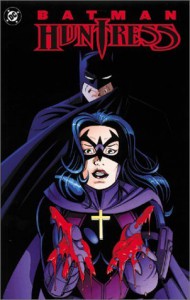 This was fantastic. This story left me satisfied unlike The Hiketeia. Now don't get me wrong, The Hiketeia was very well written, but just felt abrupt and like it could've benefited from being much longer. Did not get this feeling here. I'm still a novice in the DC world, but Rucka created another great starting point for learning about another character in the DC universe. In fact, I think she may have just become my favorite character.
This was fantastic. This story left me satisfied unlike The Hiketeia. Now don't get me wrong, The Hiketeia was very well written, but just felt abrupt and like it could've benefited from being much longer. Did not get this feeling here. I'm still a novice in the DC world, but Rucka created another great starting point for learning about another character in the DC universe. In fact, I think she may have just become my favorite character.



